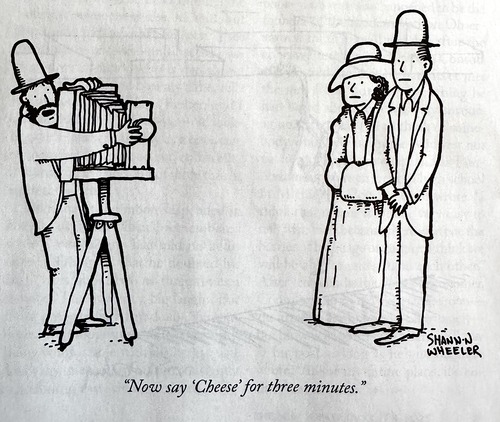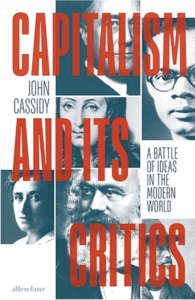Commuters

From Paul Day’s frieze in St Pancras Station in London.
Quote of the Day
”Every civilization that has ever existed has ultimately collapsed. History is a tale of efforts that failed, or aspirations that weren’t realized. So, as a historian, one has to live with a sense of the inevitability of tragedy.”
Musical alternative to the morning’s radio news
John Prine | Souvenirs | Live from Sessions at West 54th Street
Link
Long Read of the Day
The commander-in-cheat comes to Scotland
Lovely Observer column by John Niven on what can be learned from watching how Trump ‘plays’ golf. He is, says Niven, “the biggest golf cheat of the modern age”.
This is already well known in the golfing community and was documented at length by the sports writer Rick Reilly in his book Commander in Cheat. Trump cheats in every way possible: he improves his lie. He has his caddy drop a new ball if the old one is lost. He just doesn’t count shots he doesn’t like. (To be fair, this last offence isn’t unique to Trump. It is endemic with American golfers, many of whom will take a “breakfast ball” off the first tee, which simply means not counting your first shot if you don’t like it. They’ll take “mulligans” all over the course, which again means just not counting a bad shot.) All of this is how Trump manages to maintain a golf handicap of 2.8: even lower than Jack Nicklaus’s. If you believe that, I have some NFTs to sell you.
And this week, Trump’s disgraceful reputation was soiled even further (something I thought impossible, like Spud further soiling those bed sheets in Trainspotting) when he was caught – on camera – cheating at golf in Scotland. That’s right, the Dockers-Clad Sweating Oaf Sex Pest chose to cheat at golf at the home of golf. For a golfer, this is like a Catholic not only committing adultery but choosing to commit it in the Vatican. In the Papal Audience Hall. In front of the Pope. From behind. Using a condom. While singing Orange Lodge songs.
It’s a lovely piece which raises an interesting question for the R&A, the organisation that decides where the British Open is played every year. Trump has been lobbying them for years to have his Turnberry course chosen for that signal honour, so far without success. So now we will see whether the R&A has anything that might be described as a backbone. My guess is that they will cave, just as most organisations do when confronted by the Cheat-in-Chief.
My commonplace booklet
Tyler Cowen, the well-known US economist, was invited to 10 Downing Street recently to give a talk about AI. Afterwards he gave a talk at DeepMind, part of which was about how quickly he thought the technology would have a big impact on society. You can find the video and the transcript here, but it’s long, so I asked Claude.ai to give me a summary of the main points he made on this particular topic. Here’s what it provided.
Core Argument: The speaker believes in “slow takeoff” – not because AI models won’t advance rapidly, but because translating AI progress into improved living standards will take much longer due to institutional and practical barriers.
Household Budget Analysis: Tyler examines how AI will affect the major categories of household spending:
Rent (pessimistic outlook): • AI won’t lower housing costs anytime soon • The main constraint on housing is legal/regulatory, not construction costs • AI might even increase rents in tech hubs by making proximity to smart people more valuable
Food (slow improvement): • Even simple agricultural innovations historically take decades or centuries to spread geographically • Despite free trade and shared languages, US agricultural productivity improvements haven’t quickly spread to Mexico • AI-driven food innovations will happen but won’t meaningfully reduce food costs for typical families within 10 years
Education (complex and uneven): • Already millions of people are smarter due to AI, but distribution is highly asymmetric (maybe 5-10% significantly benefit now) • Educational institutions are slow to change due to their nonprofit structure and multiple stakeholders • Getting 2/3 of students to benefit could take 10+ years • Tuition costs likely won’t decrease – people will still pay similar amounts even if they get better education
Healthcare (long-term optimistic): • AI will eventually “cure everything” over 30-40 years • Regulatory barriers (like FDA approval taking ~10 years) will slow implementation • In the near term, healthcare costs may actually increase due to more available treatments • Living standards won’t improve much until later in life when serious health issues typically arise
Overall Conclusion: Even with massive optimism about AI model progress, the impact on GDP and living standards will be slow due to imperfect human institutions that change gradually. The bottleneck isn’t AI capability but implementation and adoption barriers.
It may be just confirmation bias, but that last para seems realistic to me.
Linkblog
Something I noticed, while drinking from the Internet firehose.

Shannon Wheeler’s lovely cartoon in the New Yorker. Made me wonder what Julia Margaret Cameron used to say to her subjects.
Feedback
All the stuff about Trump in Monday’s edition reminded Steve Evans, a journalist on the Canberra Times, of the fact that Philip Roth in 2004 had published a novel, The Plot Against America which imagines “an alternative history in which Franklin D. Roosevelt is defeated in the presidential election of 1940 by Charles Lindbergh. The novel follows the fortunes of the Roth family during the Lindbergh presidency, as antisemitism becomes more acceptable in American life and Jewish-American families like the Roths are persecuted on various levels”.
In 2017, after Trump’s election. Judith Thurman, a New Yorker writer had the bright idea of emailing Roth asking him if the scenario envisaged in his novel had now happened in the US. He responded:
“It is easier to comprehend the election of an imaginary President like Charles Lindbergh than an actual President like Donald Trump. Lindbergh, despite his Nazi sympathies and racist proclivities, was a great aviation hero who had displayed tremendous physical courage and aeronautical genius in crossing the Atlantic in 1927. He had character and he had substance and, along with Henry Ford, was, worldwide, the most famous American of his day. Trump is just a con artist. The relevant book about Trump’s American forebear is Herman Melville’s ‘The Confidence-Man,’ the darkly pessimistic, daringly inventive novel—Melville’s last—that could just as well have been called ‘The Art of the Scam.’”
This Blog is also available as an email three days a week. If you think that might suit you better, why not subscribe? One email on Mondays, Wednesdays and Fridays delivered to your inbox at 5am UK time. It’s free, and you can always unsubscribe if you conclude your inbox is full enough already!

















